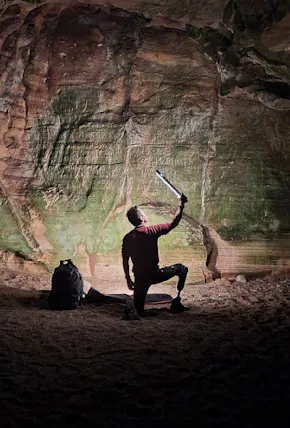Colin O’Brady is known for moving fast and far over the most harrowing terrain on the planet. As an explorer and endurance athlete he has set ten world records, including becoming the first person to cross Antarctica solo and unassisted. Which is why his new book, The 12-Hour Walk, might come as a surprising change of pace. The man who holds the speed record for summiting the highest point in all 50 US states is advocating for the life-changing power of a very long stroll?
O’Brady, a longtime meditator, knows full well how meaningful it can be to engage in contemplative action. After all, the balance required to stay calm when navigating a perilous river crossing, the resilience we call upon when one more step—let alone one more mile—feels impossible, and the embodied presence we discover when waiting out an afternoon thunderstorm in the wild, can all be cultivated on the meditation cushion. Mindfulness and nature have a mutually informative relationship that can enrich and embolden our engagement with the outdoors.
In order to find out more about how an intentional commitment to such an endeavor can challenge and inspire the explorer in all of us, we caught up with O’Brady to find out more.
Where'd you get the idea for The 12-Hour Walk?
When I was crossing Antarctica alone in 2018 I was pulling my sled in silence for 12 hours per day. In the latter half of that crossing I felt deeply connected to mind, body, and spirit. Despite my body being worked, despite my ribs protruding, despite the frostbite on my face and limited food, I found this sort of flow state, this connection to purpose and fulfillment. I thought I could take that with me forever.
Then March 2020 came. Everyone's locked down, everything’s canceled, there’s terrible news every day, people are getting sick and dying. I got myself in a deep hole of depression, anxiety, fear, and doom scrolling. Finally, I was like, 'I’ve got to do something! When was the last time I felt super connected in my mind, body, and heart?' It was when I was walking across Antarctica alone, pulling that sled. So I said to my wife, 'Tomorrow morning, I'm going to get up and I'm going to go for a 12-hour walk here on the Oregon coast.'
I walked out the front door, put my phone in airplane mode, and engaged in the walk with no distractions, completely in silence. It was an incredible feeling. I tapped back into that flow, that depth, that purpose. When I got back home that night, my wife, Jenna, looked at me and said, 'Your back.' I said, 'Yeah, I'm back. I finished the walk.' She was like, 'No, you're back. I can see it in your face.' And she was right, I had returned to center.
What made you think that this could be meaningful for other people who aren't adventurers like yourself?
During COVID, we all knew all sorts of people that were going through the same thing as I was in that moment: trapped in their houses, lives disrupted, totally isolated. I started suggesting this walk to people of all ages and fitness levels. It’s not a crazy endurance challenge. My 77-year-old mother-in-law did the walk and what that looked like for her was going one time around her block and sitting on her front porch for an hour maintaining stillness and noticing the sensations around her, then going around again, for 12 hours.
As all these different people reacted to the experience, every single person would come back to their front door feeling better, feeling less stuck, feeling stronger in their own mind, body, and spirit. People were on a path that they hadn't been on and this reset was so necessary. That was really the aha moment.










